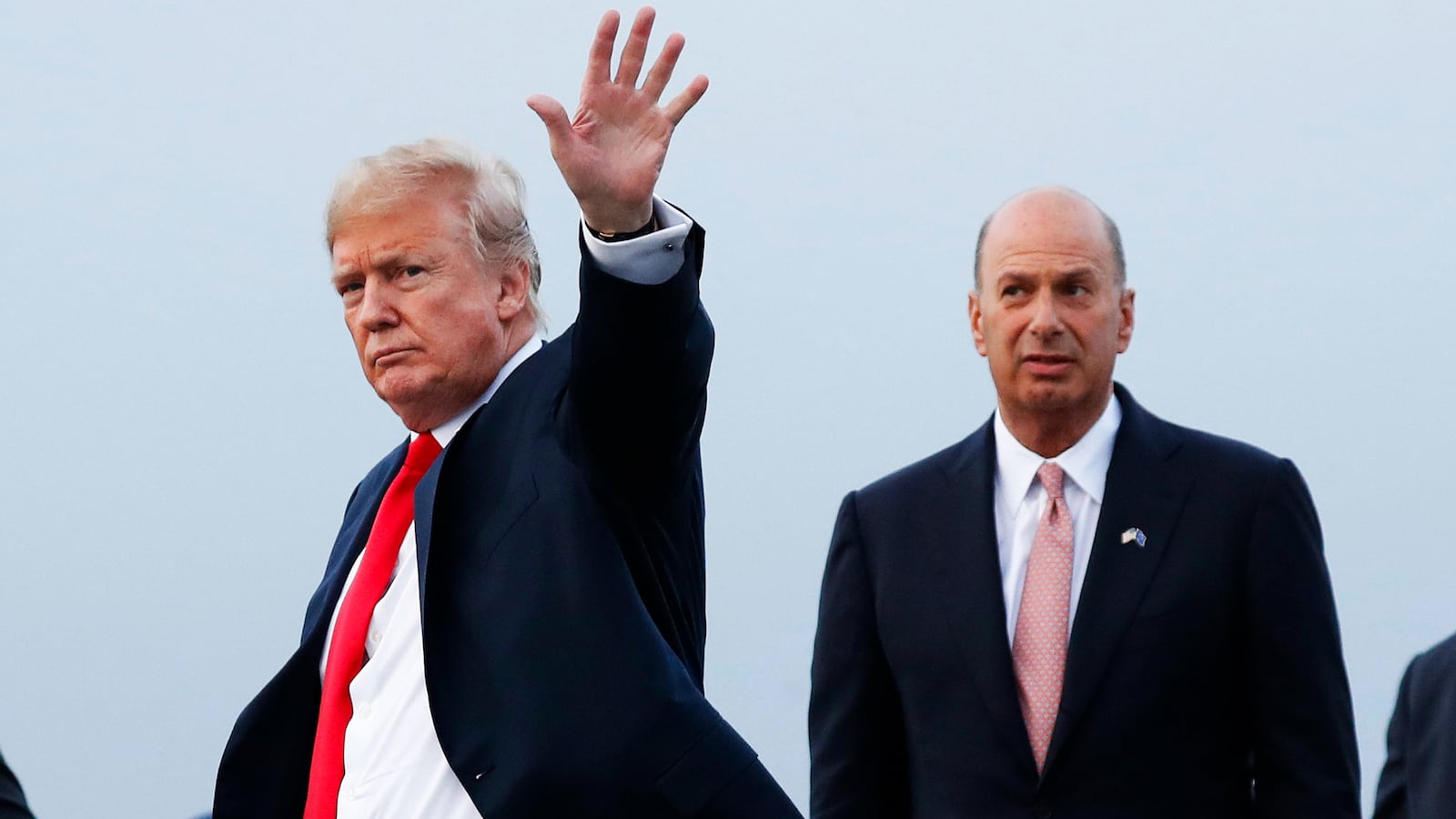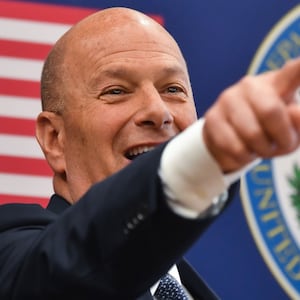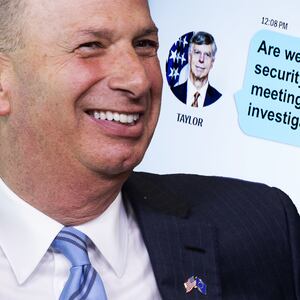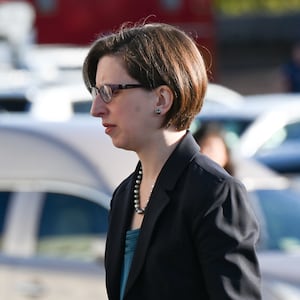Ukrainian officials arrived at the White House on July 10 expecting something approaching normal. They were in Washington for a scheduled meeting with then-National Security Adviser John Bolton with a plan to propose a new path for U.S.-Ukrainian relations under the umbrella of energy and security cooperation. All seemed to go well—until U.S. Ambassador to the European Union Gordon Sondland stepped in. “That’s when things really went off the rails,” one person in the room said.
It’s been widely noted in testimonies by multiple House impeachment witnesses that Sondland interrupted the conversation between Bolton and the Ukrainians when he suggested that the Kyiv officials open investigations into Hunter Biden and the gas company he worked for if they wanted President Volodymyr Zelensky to land a White House meeting with Donald Trump.
Bolton immediately cut the get-together short, witnesses said, in an attempt to save what had until then been a normal meeting. But what’s been less clear—until now—is what happened moments later, when Sondland guided the Ukrainians into the White House’s Ward Room. Three individuals familiar with the conversation described what happened next.
Sondland continued to not just relay, but demanded ferociously, that the Ukrainians open the Biden investigations, saying it was the only chance for Washington and Kyiv to develop any further meaningful relationship, two individuals with knowledge of Sondland’s overtures said.
Sondland raised his voice several times in his attempt to persuade the Ukrainian officials sitting across from him, including Andriy Yermak, a close aide to Zelensky, and Zelensky’s then-national security adviser Oleksandr Danylyuk. One individual told The Daily Beast that Sondland “got very emotional,” adding that “there was lots of yelling.” Another individual called the meeting “erratic” and said the Ukrainians began to ignore Sondland and instead turned to Fiona Hill, who ran the National Security Council’s Russia desk at the time, for clarification on Washington’s messaging.
Sondland has previously tried to claim he didn’t know much about a quid pro quo with Ukraine—until he suddenly told Congress he now recalls the deal. But the details of Sondland’s behavior in the Ward Room underscore the intensity in which the EU Ambassador advocated for the investigations into Biden and Burisma.
The details also raise questions about how Sondland will perform in his public testimony in front of House impeachment investigators Wednesday. He is slated to appear this week along with a slew of other top U.S. officials, several of them from the State Department, to answer questions about what he knew of the efforts to oust U.S. Ambassador Marie Yovanovitch and Rudy Giuliani’s campaign to convince Ukraine to launch certain investigations.
Out of eight witnesses, Sondland is likely to face the most intense scrutiny, especially because of his direct communication with President Trump. Last week the top diplomat in Ukraine, William Taylor, told lawmakers his aide heard Sondland on the phone with Trump in a Kiev restaurant talking about “the investigations.” On Friday, David Holmes, a State Department aide in Kyiv, told House investigators during a closed-door deposition that he was one of the individuals that overheard the president ask Sondland: “So, is he going to do the investigations?” Sondland replied by saying Zelensky “loves your ass” and said the president would pursue the investigations.
Lawmakers are likely to hone in on what else Sondland and Trump discussed on that call and other calls, and what pressure the president put on the Ambassador to relay the investigation demands to Kiev.
Several other witnesses in the impeachment inquiry testified about Sondland’s involvement in the Ukraine portfolio during their depositions with House investigators. National Security Council official Lt. Colonel Alexander Vindman, Hill and the former lead on Ukraine negotiations Kurt Volker all provided details about Sondland in their testimonies and spoke in particular detail about the Ward Room meeting.
In her previous, closed-door testimony, Hill told investigators that Sondland told her in late June that he was “in charge” of the Ukraine portfolio. “And I asked, ‘well, on whose authority?’ And he said, ‘the President,’” Hill said.
On Saturday, the Intelligence Committee released more testimony suggesting the president was actively involved and briefed on Sondland’s discussions with senior officials in Ukraine regarding the U.S. hold on military aid to the country. Tim Morrison, a senior Trump National Security Council official, testified that Sondland gave repeated assurances that he was acting with the president’s backing.
“Ambassador Sondland believed and at least related to me that the President was giving him instruction,” Morrison said. “He related to me he was acting—he was discussing these matters with the President.”
Sondland told Andriy Yermak, one of Zelensky’s top aides, during a “sidebar” meeting in Warsaw that “what could help them move the aid was if the prosecutor general would go to the [mic] and announce that he was opening the Burisma investigation,” Morrison said.
Hill also talked about the Ward Room meeting, which she attended in July. She said her director for Ukraine was “completely alarmed” by Sondland’s behavior as were the Ukrainians in the room, particularly Danylyuk.
Both Hill and Vindman told House investigators, too, that Sondland had communicated to them and others that he was working with acting White House Chief of Staff Mick Mulvaney on a plan to press Ukraine to launch investigations in exchange for a meeting in Washington with President Trump.
In his deposition, Vindman told investigators that “Sondland relatively quickly went into outlining how the—you know, these investigations need to—on the deliverable for these investigations in order to secure this meeting.”
When asked how Sondland came to believe the “deliverable” was necessary, Vindman said: “I heard him say that this had been coordinated with…Mulvaney.”
Other witnesses set to appear next week could offer more precise details about the timeline of the withholding of U.S. military aid and its connection to investigations in Biden and Burisma. Volker and Hale have offered varying versions of when they learned of a quid pro quo. Volker said he learned about the holdup as early as June.
In her deposition, Pentagon official Laura Cooper said she learned of the holdup of aid as early as July 18. She also said the Pentagon received a series of mysterious questions that originated from the White House regarding details of the military aid, including which U.S. companies were involved in supplying equipment to the country.
The deposition transcript for Under Secretary of State for Political Affairs David Hale has yet to be released.










